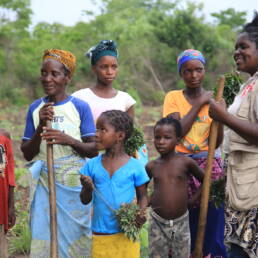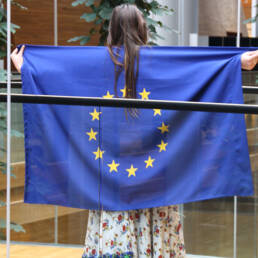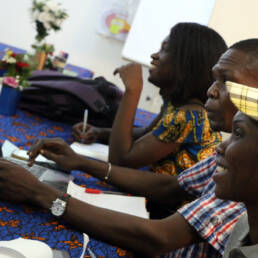Migration & development
Making migration a choice not a necessity
Migrants contribute to the development of European societies and economies as well as to that of their countries of origin.
In Europe, migrants are often employed in sectors with a high labour market need, such as agriculture, home care, cleaning or manufacturing. Migrants also create innovative enterprises and businesses in Europe and are active in highly skilled domains, such as medicine, law, research or academia. Through taxes and social contributions, migrants help keep European welfare systems healthy – contrary to public perception – contributing more than they receive. From new ideas to alternative worldviews and cultural traditions, migrants also make their host societies richer and more diverse.
Migration, including seasonal and temporary migration, is a key survival strategy for many, including for households and communities living in vulnerable situations. Migrants and diaspora groups also contribute to their communities of origin by investing in new sustainable businesses or in infrastructure that is vital for the development of the region or the country (schools, hospitals, community centres, roads and much more).
The EU has assumed a stronger and more visible external role on migration over the last 20 years and particularly since 2015, when larger numbers of migrants arrived in Europe. The EU engages with neighbouring countries and especially with the African continent to manage migration, using foreign policy and development cooperation instruments as tools to reduce migration.
Migration has become a deeply contentious issue in Europe, undermining migrants’ recognition as development actors and negatively impacting foreign political relations.
Negative perceptions around migrants and migration are on the rise in Europe. While many citizens show solidarity towards migrants, an increasing part of the public rejects them and has misconceptions about migration and development. This is often grounded in negative messages and fake news about migration, generated and amplified by populist politicians and the media.
Regardless of positive initiatives such as the Global Compacts on Migration and on Refugees, the EU’s migration agenda increasingly prioritises the goal of limiting migration, expanding border control and reducing access to basic rights and protections for migrants and refugees. Facilitating regular migration to Europe and maximising the development benefits of migration remain unaddressed. Moreover, migrants and diaspora communities are still insufficiently consulted on these issues.
Under its objective of addressing the so-called root causes of irregular migration, the EU links development cooperation with migration management. Certain financial instruments, such as the migration component of the EU’s external action budget, were established with the short-term goal of addressing migratory pressures from particular countries. At the same time, policy dialogues on migration have prioritised immigration control over the promotion of more legal migration channels or positive synergies between migration and development. The Joint Valetta Action Plan is a clear example of this. There is a real risk that development cooperation, supposed to fight poverty and reduce inequalities, is instead being used by the EU to support short-term migration control goals or as a bargaining chip to secure the cooperation of non-EU countries on border control, returns and readmission of migrants.
The EU, while still not meeting the collective commitment of dedicating 0.7% of its gross national income to official development assistance, risks diverting these scarce development aid resources to fund migration control policies, undermining its legally binding commitment of using development aid for the primary objective of poverty eradication.
Migration as a driver of development
Caritas Europa envisions a European society which understands the complexities of migration and recognises that migration is an intrinsic part of human existence and will continue to be so in the future. We also imagine a European society that promotes sustainable development, fosters solidarity and protects human dignity across Europe and globally, leaving no one behind.
To maximise the development benefits of migration in countries of destination and origin, we call on the EU and its Member States to:
- Align policies on migrant integration with the 2030 Agenda and SDGs framework, particularly with respect to social and economic inclusion;
- Implement policies that allow for safe and legal migration to Europe and easier circulation between Europe and countries of origin to facilitate the engagement of migrant and diaspora communities across borders;
- Ensure that their external policies facilitate, or at least not impair, existing arrangements of regional mobility in other parts of the world.
To ensure that external policies on migration do not undermine human dignity and are in line with global commitments on development cooperation, we ask the EU and its Member States that:
- Development aid is directed to countries and areas that need it the most, instead of countries that are strategic from a migration management point of view;
- Development aid is not used to serve the EU’s own interests, such as for limiting migration. It should rather be used to tackle the root causes of poverty, conflict, injustice and inequality to ensure that everyone – regardless of migratory status – has access to a dignified life;
- Cooperation between the EU and non-EU countries excludes the use of any kind of positive or negative incentives, such as the use of trade or development policies, to force cooperation on migration management, border control and return and readmission;
All external policies and actions of the EU and Member States comply with existing human rights frameworks
Ask an expert
Maria Nyman
Secretary General
Stand in Policy and Advocacy Director
Tel: +32 (0)2 235 03 92
Mob: +32 (0)495 17 47 48
mnyman@caritas.eu




